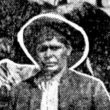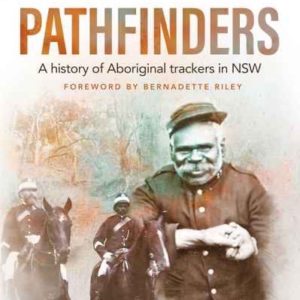Loading map...

Perhaps the best known tracker in NSW is Alexander (or Alec) Riley, who worked, mainly at Dubbo, from 1911 to 1950. His tracking feats were respected by the white and Aboriginal communities, and in 1943 he was awarded the King’s Police and Fire Services Medal for Distinguished conduct. He was also the first tracker to be promoted to the rank of Sergeant [ref]North-Western Watchman 7 January 1943:2.[/ref].
The cases on which he worked are too numerous to mention, but some of the best known include the following. In June 1923 he helped pursue and capture Roy Governor (youngest brother of Jimmy Governor) at Mendooran. Nine years later, Alec took two days to track the murderer of 92-year-old Jack Hewitt who had been battered to death at Gilgandra. On Christmas Day 1940, he was called in to look for Desmond Clark, a two-year-old boy who had gone missing from his home at Bugaldie. Alec had definite ideas about where to look but the police called off the search. It was not until seven months later that Riley was recalled to the scene and the boy’s body was found in a wash-away[ref]Dubbo Liberal 12 June 1923; North-Western Watchman 7 January 1943:2.[/ref].
Tracker Riley is also well known for his role in capturing Albert Moss who murdered three men (William Bartley, Timothy O’Shea and Thomas Robinson) near Brummagen Creek, Narromine, in December 1938 and January 1939. Detective Inspector Matthews praised Tracker Riley’s contribution:
“Tracker 1st class Alec Riley, of Dubbo, is probably the most outstanding tracker in the Commonwealth, and his ability is well known throughout the Service. He followed the tracks of a sulky driven by Moss many months before through the hills of Minore, and located his camping place there. He also found articles on Macks Reserve, which were later identified as the property of Timothy O’Shea. He also gave evidence in each of the cases, and is an excellent witness. His work generally throughout the whole of the inquiry was of a very high order[ref]Copy of NSW Police correspondence held by Bernadette Riley.[/ref]”
His other duties at the Police station included looking after the horses and collecting prisoners off the train. Alec took the horse drawn “Black Maria” for the latter job. He was dedicated to the job and continued to work on the occasional case for the Dubbo Police after his retirement. Aside from police duties, Alec was a keen footballer and a fine athlete. He coached children in athletics at Dubbo for many years[ref]Dubbo Mailbox Shopper 6 December 1995; Hodder 2003.[/ref].
Alec Riley was born at Nymagee in 1887 to John Riley and Mary Nolan. His parents came from the Lachlan River. Alec said that he learned his tracking skills from the old blacks living on the properties near Nymagee. Family members have said he was also taught by men from Condobolin[ref]Interview with Bernadette Riley at Dubbo, 10 March 2015.[/ref]. He married Ethel Taylor, an Aboriginal woman from Dubbo, at Wellington in 1910 and together they had eight children. One of his children, Allan Riley, married Dorothy May Wright, the daughter of another tracker, Reuben Wright[ref]MC 1953/00962.[/ref].
While working at Dubbo, Alec lived most of the time on the Talbragar Reserve to the north of town. He continued living there after retirement, saying that he did not wish to face the “rat race” of the town itself. One of the last people to leave the Talbragar Reserve in the late 1960s, Alec Riley died in Dubbo on 29 October 1970. The police gave him full honours at his funeral[ref]DC of Alexander Riley 1970/38003.[/ref].
Alec Riley is still fondly remembered in Dubbo today. In June 1997, Riley’s grand daughter, Kathy Green, and the Minister for Roads, Carl Scully, opened a cycleway along Macquarie River named in his honour. His family regard the cycleway as a just and timely tribute for a man who did not always receive the recognition he deserved during his lifetime. In 1996, his grandson, Michael Riley, filmed a documentary for the ABC about his life which reconstructed several of his most famous cases[ref]Dubbo Mailbox Shopper 25 June 1997; Dubbo Liberal 26 October 1996.[/ref].

 This website explores the history of Aboriginal trackers in NSW from 1862 when the current NSW Police Force was established through to 1973 when the last tracker, Norman Walford, retired. You can read about the lives of individual trackers and some of the incredible tracking feats they...
This website explores the history of Aboriginal trackers in NSW from 1862 when the current NSW Police Force was established through to 1973 when the last tracker, Norman Walford, retired. You can read about the lives of individual trackers and some of the incredible tracking feats they...

There were over 200 NSW police stations that employed Aboriginal trackers between 1862 and 1973. Many were concentrated in the central-west and north-west of the state, the agricultural and pastoral heartland of NSW. This is because one of the main jobs of trackers was to pursue sheep, cattle and horse thieves. Trackers sometimes lived in small huts out the back...
Learn More ►
Pathfinders book Pathfinders, A history of Aboriginal trackers in NSW, written by Dr Michael Bennett and published by NewSouth, is now available from all good bookstores. Click on the link below to order your copy. https://www.abbeys.com.au/book/pathfinders-a-history-of-aboriginal-trackers-in-nsw.do Early History Since the beginning of the colony, government agencies, explorers, surveyors and members of the general public called upon the tracking...
Learn More ►